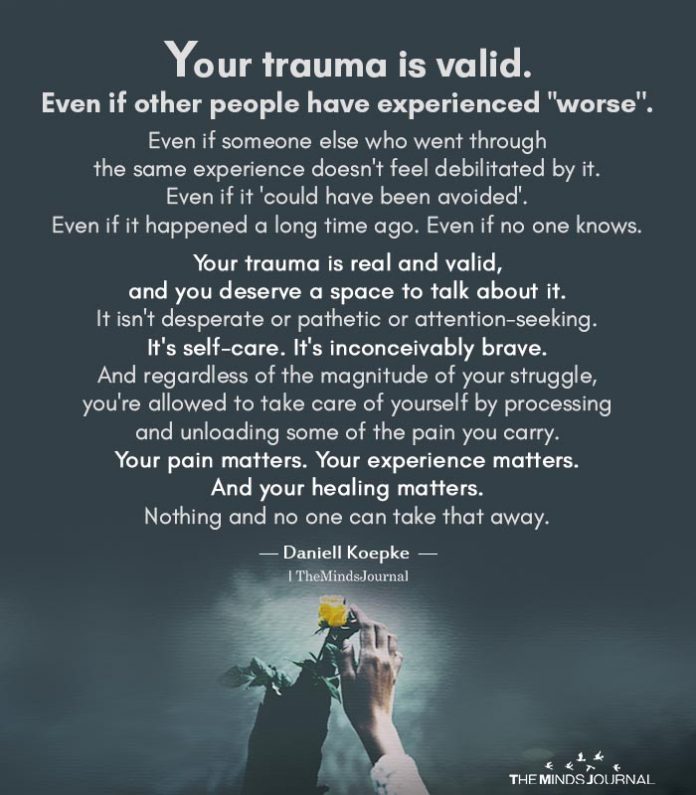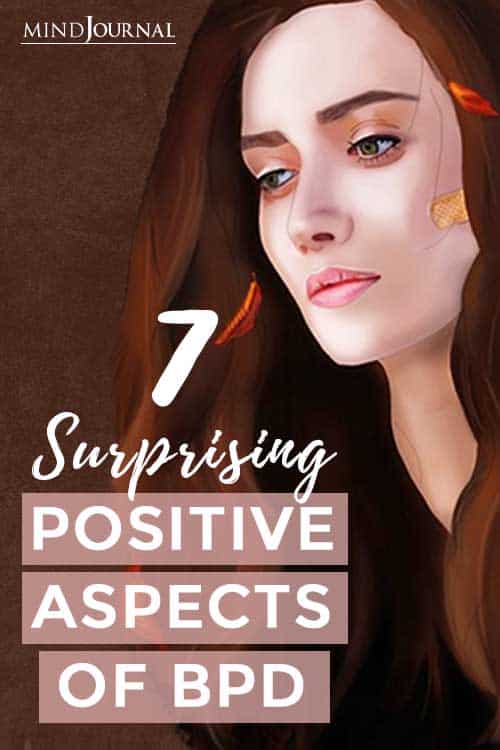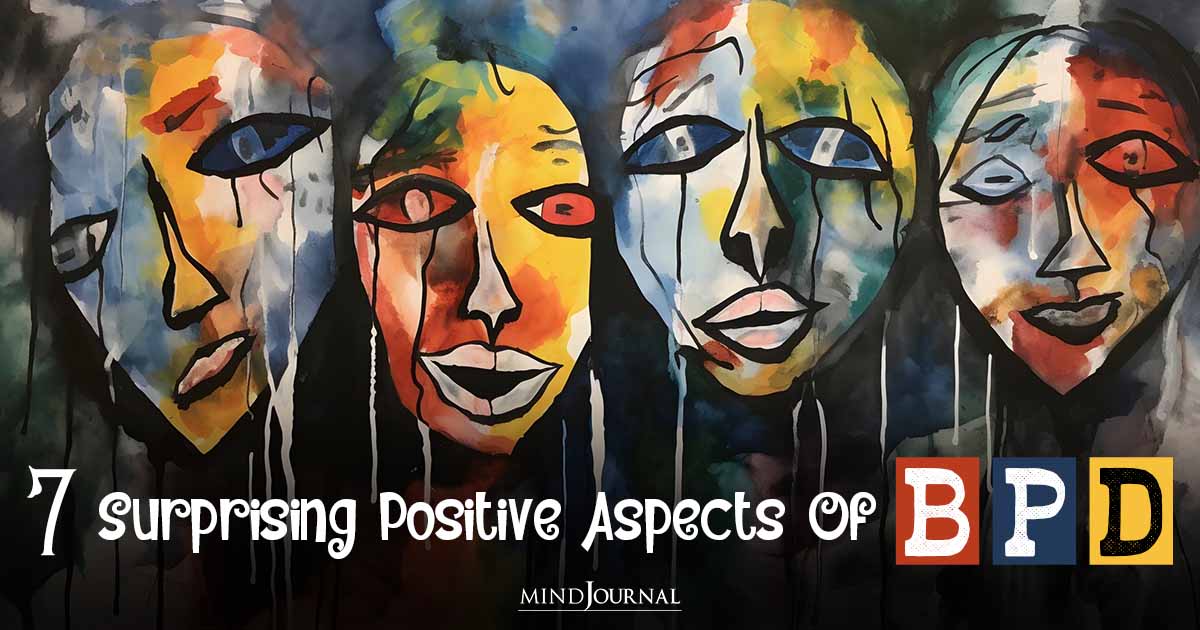Believe it or not, there are quite a few positive aspects of BPD. Understanding this can go a long way in destigmatizing how people with BPD are treated. Let’s find out more about the positive aspects of BPD.
Borderline Personality Disorder, or BPD, is one of the most stigmatized conditions there is. Having ‘symptoms’ of BPD, such as emotional outbursts or suicidal thoughts, can be extremely painful, but it does not take over your entire identity.
This article addresses some of the positive aspects of BPD. Unfortunately, the majority of the research literature and internet resources focus on the negative aspects of BPD, often forgetting that behind the symptoms is a whole person.
People assume that when you are diagnosed with a ‘mental illness’, it is a bad thing. The truth is, behind the diagnosis, there is a whole person- someone who, alongside their intensity, has creative gifts, empathy, deep love for the world, and infinite potential.
BPD is the target of more than its fair share of stigma, by mental health practitioners, the media, and the general public. Many resources on the internet focus on the negative aspects of BPD, perpetuating the misjudgement around it. When people focus solely on the negatives symptoms, they forget about the person behind the label.
Many people with BPD are deep thinkers, intuitive feelers, and many are intellectually gifted. Contrary to popular belief, most BPD sufferers are highly introspective and self-aware. With a process of healing and transformations, they are the most empathic leaders and visionaries.
This is not to glorify mental illnesses or invalidate the pain of living with emotional storms. As someone who has been given the BPD label, what you need is not more judgment. What you need is a deep understanding of what has caused these symptoms, to know it is not your ‘fault’ that you suffer, and to harness the positive aspects of your personality.
Here are seven gifts that are embedded within the BPD matrix.
Related: How To Cope When Someone You Love Has BPD
7 Surprising Positive Aspects Of BPD
1. You have deep empathy
When en emotional storm takes over, you may temporarily lose perspective or act erratically. Because of your struggles in relationships, some people might say you have little empathy. This is, however, an unfair and skewed assumption.
Many people with BPD identify as being an ‘empath’. An empath is someone with so much empathy that they feel others’ pain as their own; they sometimes cannot separate their own emotions from others’.
Certain psychological theories may explain why this is: It might be due to overactive activity of your mirror neurons, unique wiring of your brain, certain hormone in your physiology, or a volatile childhood environment in which you were ‘trained’ to become hyper-vigilant (You might have to detect early warning signs of your parents’ anger to protect yourself and your siblings).
Because of your personal experience, you know what it means to be in emotional pain. When others are sad, anxious, or grieving, you offer an unspoken understanding. Psychologically, others can feel soothed by your presence. Spiritually, those who suffer know you speak their language.
2. You are deeply perceptive
Research has found people with BPD can read facial expressions and subtle shifts in moods more accurately than those without BPD. Many people with BPD and their friends even joke they have ‘psychic abilities’.
This perceptiveness comes with its blessings and perils. It may make life more difficult as you see hypocrisy, injustice, and deception everywhere. People might feel threatened by you as they did not want to be seen through.
It may take you a while to found a way to use your intuition without offending others. Once you have, however, the ability to be perceptive and intuitive is a powerful skill that brings you much personal and career success.
3. You can channel your pain into art
Many people with BPD channel their pain visually, poetically, musically, or otherwise. Historically, gifted and talented artists, writers, and actors/ actresses have made meaning out of their mental distress and existential anxiety.
The pain of BPD can be so massive that it is beyond words. This is when the arts become its channel of expression. By doing so, you refuse to be a victim. By expressing your soul via creative means, you are reaching out to the world.
Somewhere, someone is waiting to know there is someone out there feeling what they are feeling. Once you have found a language for your emotion, you are on your way to inspire the world.
Related: Loving Someone With Borderline Personality Disorder
4. You have a deep capacity to love
Another myth about BPD is that people with the condition cannot love in the same way everyone else does. This is demonstrably false. Whether or not they show it on the surface, people with BPD love and care with their whole being.
The push-pull pattern and instability they have are a result of your trauma. Having been wounded deeply by abandonment, rejection, or neglect early in your lives, intimacy becomes a challenge. It is not that you don’t want to love, but your fears and insecurities hold you back from being the best self you can be.
You love fiercely and can be hurt deeply, so it can be challenging for you— especially at the start— to relax in a relationship. When you feel safe enough, however, you make a sensitive, passionate, and extraordinary friend, parent, and life partner.
5. You know what it means to have an invisible trauma
Unlike a physical injury or disability, BPD is invisible. It is, nevertheless, one of the most painful conditions anyone could have. You might also have suffered from other invisible trauma such as childhood neglect or emotional abuse.
People often dismiss the suffering of someone who looks fine on the surface. But you know what can lie beneath the surface of a façade. Your story also offers you a deep well of compassion.
At your best, you are liable to champion the voices for others. Many people with BPD are gifted activists who champion the rights and voices of others.

6. You see the beauty of the world
Being a naturally sensitive person, you are pained by the collective pain of our world; but on the flip side, you also have a profound understanding of beauty.
You don’t take love for granted, ’little things’ such as a single line in a song or a gesture from a romantic partner can be almost overwhelming.
You feel the world with a different vibration, and you are vividly alive. You know despair, but you also know deep love and ecstasy.
Being able to feel so keenly is a downside when the emotions are challenging, but it is also a gift.
7. You may not feel it, but you are exceptionally resilient
BPD does not break you; it shapes you, forces you to look inward, and make you a stronger human. Like a tree, you bend, but you do not get destroyed. You have been through so much pain and despair that you know every day is a gift.
The longer you have to learn to live with BPD, the more resilient it makes you. You become a warrior. You withstand not only the BPD symptoms but also the natural knocks that we receive as we go through life. Having been through BPD and come out the other end, you are stronger than you think you are.
At your core, you are not your mood swings. Beyond the surface, the fluctuation is a core self that is determined to be alive.
Related: What It Feels Like To Live With Borderline Personality Disorder
You have the right to be a full human!
Whether you’re a BPD sufferer yourself or have a friend or loved one with the condition, I hope this article has given you some hope. Coming to terms with a diagnosis can be a daunting path, but please don’t believe just because you have been given the label, anyone could take away all your gifts and positive personality traits.
The next step for you now is to find ways to celebrate and harness your strengths. You may decide to make a piece of music that tells your life story or use your deep empathy to offer a friend consolation.
Being misunderstood all your life is painful, and never justified. While we cannot control external judgments, it is on us to go from surviving to thriving, to not let the past haunts us, and to stand up for our rights to shine as a dynamic human.
You do not need your friends or family to understand you for you to move forward. Unlike the situation you were in as a child you are no longer powerless. If people insist on scapegoating or gaslighting you, you have the power to walk away.
If you think about all the trauma, suicidal spells, and relationship wounds you have bounced back from, you will know how strong you are at your core. Walking away despite our society’s pressure is not an easy path, but it is what you deserve.
You certainly do not need anyone’s approval to own these gifts. BPD might mark you out from the crowd and make you different, but it’s those differences that make life worth living.
I wish you well on your journey to discover the wholeness of who you are, beyond the diagnosis.
Visit Imi Lo’s website Eggshell Therapy for more such informative articles.
If you want to know more about the positive aspects of BPD, then check this video out below:
Written By Imi Lo
Originally Appeared In Eggshell Therapy












Leave a Reply